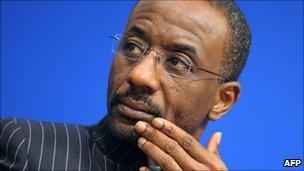Nigeria's top banker wins international recognition
- Published

It is generally thought that Mr Sanusi has little time for the political elite
Nigeria is frequently cited as one of the most corrupt countries in the world, but its central banker has won two international banking awards.
Mallam Lamido Aminu Sanusi has been named as the Central Bank Governor of 2010 for both the African continent and the entire world, by the prestigious Banker Magazine.
The editor of the magazine, Brian Caplen, says that few candidate names generate an overall consensus on judging panels, and yet, when it came to finding the best global central bank governor of the year, Mr Sanusi was chosen unanimously.
The 49-year-old was appointed head of the Bank of Nigeria in June 2009.
He has been praised for salvaging a crumbling Nigerian financial sector, including implementing reforms that have put Africa's most promising market back on the map for global investors.
The magazine's country representative, Kunle Ogedengbe, stresses that Mr Sanusi embarked on a radical anti-corruption campaign aimed at saving 24 banks on the brink of collapse.
He also pressed for the managers involved in the most blatant cases of corruption to be charged, and, in the case of two senior bankers, convicted.
"The reforms initiated by Mr Sanusi have been necessary to sanitise the banking industry," Mr Ogedengbe says.
"Had these reforms not been initiated, Nigeria would have entered into another round of banking distress."
Extensive reforms
Despite the political challenge of facing up to powerful people who held considerable sway in the country, Mr Sanusi never swerved from his approach, and won the support of the public as they were made aware of the scale of corruption.
Coming from the north, Mr Sanusi bucked the established trend of appointing southerners
"He has carried out the sort of reforms that most of the central bankers in the world would like to have carried out in their territories," Lagos journalist Anthony Osae-Brown told BBC World Service's World Business News.
Two months into his governorship, Mr Sanusi embarked on the bailout of Afribank, Intercontinental Bank, Union Bank, Oceanic Bank and Finbank.
He dismissed their chief executives in a move designed to show that banking is no longer business as usual, but institutions that must serve the economy as a whole.
Another key reform of the banking sector enforced by Mr Sanusi has been to limit the tenure of bank bosses to a maximum of 10 years.
The chief executives will have to leave office at the end of their term regardless of their record.
The implementation of a stricter disclosure policy by the Central Bank of Nigeria has also led to a culture of greater transparency in the sector.
Career path
Mr Sanusi began his banking career in 1985 by joining the merchant bankers Icon Limited, a subsidiary of Baring Brothers of London and Morgan Guaranty Trust Bank of New York.
After becoming the head of the central bank, some people dubbed his extensive reforms as the "Sanusi tsunami".
He defended his actions, saying there was no choice but to attack the many powerful and interrelated vested interests who were exploiting the financial system of the country.
At a February 2010 conference on banking in Nigeria, he described his blueprint for reforming the Nigerian financial system as being built around four pillars.
enhancing the quality of the banks
establishing financial stability in the country
enabling a healthy financial sector evolution
ensuring that the financial sector contributes to the real economy
Talking later that month, he said that the crash in the capital market had been due to the high level of financial illiteracy on the part of the Nigerian investors.
Parallel interests
In parallel to his banking career, Mr Sanusi has also contributed to the nationwide debate over Sharia law.
In 1997, he obtained a degree in Sharia and Islamic Studies from the African International University in Khartoum, Sudan.
In an article in September 2000, he noted the problem of reconciling "belief in the universal and eternal applicability of the Sharia with the need to meet the requirements of a particular milieu."
And at a seminar in Abuja his talk was entitled Basic Needs and Redistributive Justice in Islam - The Panacea to Poverty in Nigeria.
Election looming
Nigerian government borrowing has increased around 50% by late 2010, while its spending has been rising in the run-up to the presidential primaries in the middle of January - a contest whose outcome could shape the political and economic landscape for the next few years.
The excess crude account, into which Nigeria saves windfall oil income, has dropped to $300m (£193m) from $20bn at the start of the presidential term in 2007.
The political uncertainty also means major pieces of policy, including some multi-billion dollar investment decisions, are on hold until after the elections.
The biggest decision regards the Petroleum Industry Bill, which will re-write Nigeria's decades-old relationship with foreign oil firms.
It will redefine the fiscal and legal framework governing investment, including its key offshore fields which are expected to yield most of its future production growth.
Until that bill passes, foreign oil firms will keep multi-billion dollar investments on hold.
Potential investors in the planned privatisation of the domestic power sector, one of the cornerstones of President Jonathan's policy, are also unlikely to go beyond statements of interest until the elections are over.
But banking reforms continue apace and the five-year tenure of Mr Sanusi means even a change in president is unlikely to derail them.
- Published9 October 2010
- Published13 August 2010
- Published5 August 2010